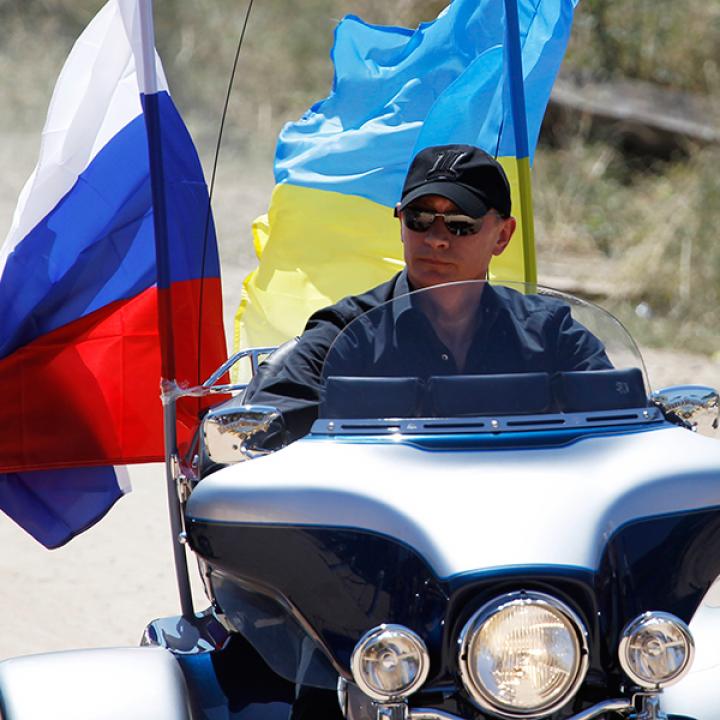
- Policy Analysis
- Articles & Op-Eds
How Donald Trump's Rhetoric on NATO Works to Vladimir Putin's Advantage

To the Russian leader, a wavering U.S. commitment to the alliance vindicates an approach based on bold action in Georgia, Ukraine, and Syria and increasing aggressiveness toward American forces.
To see Donald Trump's rhetoric on NATO strictly through the lens of U.S. politics would be a mistake. Mr. Trump has called the alliance "obsolete" and questioned the U.S. commitment to defend NATO allies. Former House Speaker Newt Gingrich has echoed these sentiments, asking why the U.S. should "risk nuclear war for some place which is in the suburbs of St. Petersburg."
In an election year, it is tempting to dismiss as partisan division such divergence from long-standing U.S. policy (itself recently reinforced by President Barack Obama's announcement that U.S. troops would join new multinational forces in Eastern Europe). Some may believe, as Czech Prime Minister Bohuslav Sobotka has predicted, that U.S. policy toward NATO will remain unchanged no matter who wins in November.
Russian President Vladimir Putin, however, probably sees the growing skepticism toward NATO not as an unexpected twist in the U.S. political debate but as the intended outcome of a Russian policy designed to deter the United States.
Consider: Russian forces have acted boldly in Georgia, Ukraine, and Syria. They have become increasingly aggressive toward U.S. forces. Analysts have had to reassess Moscow's willingness to take risks. Meanwhile, Russia has threatened to use nuclear weapons to counter conventional threats and quickly close conflicts, a strategy it describes as "escalate to deescalate."
To Mr. Putin, wavering in the U.S. commitment to the NATO alliance is vindication of this approach. He will not fail to highlight U.S. vacillation to Eastern European states, where leaders may increasingly feel pressure to hedge their bets on U.S. support against Russia and other threats. This vicious cycle could result in the success of a Russian strategy to "destroy our alliance, not by attacking it but by splintering it," as the commander of U.S. Army forces in Europe, Lt. Gen. Ben Hodges, put it last year.
The weakening or disintegration of NATO would represent a grievous strategic loss for the United States. It is easy sometimes to forget why the U.S. defends nations as small, distant, and seemingly irrelevant to its everyday security as Estonia or Latvia; for that matter, some might make the same argument of Germany and France, which seem capable of defending themselves.
The reasoning is twofold. First, when states join with the U.S., they are not joining with our adversaries and potential enemy alliances the U.S. faces are weaker than they otherwise might be. This in turn heads off the rise of regional hegemons in Europe and Asia that could threaten U.S. interests, challenge Washington for dominance of the global commons, and influence or revise the rules of international order.
Second, allies enhance U.S. power. They often allow us to forward-deploy forces, which helps to more quickly confront threats. They share intelligence, enhancing U.S. understanding of threats, and sometimes act on intelligence Washington provides. Ideally, they field forces that are inter-operable and complementary with our own, providing local support that can be keenly missed when it is absent (see: Syria and Iraq). This power amplification goes beyond the military sphere, as U.S. allies tend to adopt trade policies and diplomatic agendas generally supportive of or at least compatible with Washington's.
Seen through this prism, the value the United States derives from NATO far exceeds its expenditures. Our allies' investment in defense -- a trigger for Mr. Trump's suggestion that the U.S. might not defend the Baltics -- is vital, but the amount they spend is arguably less important than what capabilities they develop and how those are used. It is more useful today, for example, that an Eastern European ally prepares to defend against the sort of "hybrid" or "grey zone" warfare that Russia has employed in Ukraine than contribute symbolic F-16 sorties in the Middle East.
This same logic guides NATO's recent decision to deploy U.S. and other forces to Poland and the Baltics. U.S. military strength may be unmatched, but its utility depends on how it is employed. Far more troops would be required to oust Russian forces after they invade a NATO ally than would be needed to deter Moscow from chancing such a gambit in the first place. Forward-deploying NATO forces is more likely to prevent conflict with Russia than to cause it; it's also why further reinforcements of the alliance's eastern flank are needed.
In war, NATO would be a formidable alliance. But its greatest contribution to U.S. security, and its founding purpose, is to prevent war. It's easy to see why so many consider that success worth preserving.
Michael Singh is the Lane-Swig Senior Fellow and managing director at The Washington Institute. This article originally appeared on the Wall Street Journal blog "Think Tank."
Wall Street Journal



